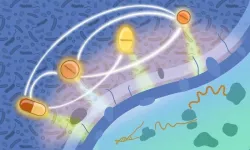(Press-News.org) As climate change warms the planet and droughts are anticipated to become more frequent and extreme, a new study reveals how reduced water flows and rising atmospheric temperatures are set to heat our rivers - creating major challenges for aquatic life, ecosystems, and society.
Water temperature is an important control for all the physical, chemical, and biological processes in rivers. It is particularly important for organisms that cannot regulate their own body temperature, such as fish. River temperature is important for human health and industrial, domestic, and recreational uses by people.
Scientists have identified three primary mechanisms that drive river water temperature increases during droughts: atmospheric energy inputs; physical habitat influences (shading and river channel shapes controlling flow); and the contributions of different water sources – groundwater tends to cool rivers in summer.
A review published in Hydrological Processes, led by University of Birmingham in collaboration with the University of Nottingham and the Scottish Government’s Marine Directorate, highlights that intense shortwave radiation during hot and dry periods is likely to be the biggest factor of high river water temperatures.
This combined with declining water levels and volumes, and slower flow velocities during droughts will warm up waters more quickly. However, the authors emphasise that cooling effects from groundwater inputs, channel shading and evaporation can offset high temperatures in certain circumstances.
Co-author David Hannah, Professor of Hydrology and UNESCO Chair in Water Sciences at the University of Birmingham, commented: “Rising river water temperatures can have significant and often detrimental implications for aquatic life, impacting both individual species and entire ecosystems.
“Drought conditions often coincide with high atmospheric temperatures and such trends will become more intense and frequent with climate change - with major implications for river water temperatures due to the combination of intense solar radiation and lower (and slower) water flows.
“However, certain management interventions such as riverside planting, and river restoration initiatives – including recreating natural channel forms and reconnecting groundwaters – could help to offset high thermal extremes during droughts if interventions are well targeted.”
The researchers note that more holistic, catchment-wide approaches to river restoration are required that consider how high river water temperature extremes can be offset while delivering other environmental and ecological benefits. The study authors call for new scientific approaches examining how the processes operating across the three mechanisms they have identified interact – helping to better inform models capable of estimating where and when high river thermal extremes are likely to occur during droughts.
Lead-author Dr James White, from the University of Birmingham, commented: “Our work highlights critical future research questions that will help us to better model river water temperature dynamics during droughts – helping river managers to work out how thermal extremes could be better managed through mitigation and adaptation strategies.”
ENDS
For more information, interview requests or an embargoed copy of the research paper, please contact Tony Moran, International Communications Manager, University of Birmingham on +44 (0)782 783 2312 or t.moran@bham.ac.uk. For out-of-hours enquiries, please call +44 (0) 7789 921 165.
Notes to Editors
The University of Birmingham is ranked amongst the world’s top 100 institutions, its work brings people from across the world to Birmingham, including researchers and teachers and more than 8,000 international students from over 150 countries.
Drought impacts on river water temperature: a process-based understanding from temperate climates - J. C. White, K. Khamis, S. Dugdale, F.L. Jackson, I.A. Malcolm, S. Krause & D. M. Hannah is published by Hydrological Processes.
This research was supported by the Environment Agency under associated grant number SC220027. END
Drought conditions expose rivers to hotter water temperatures
2023-10-18
ELSE PRESS RELEASES FROM THIS DATE:
The right to be forgotten: ESMO calls on EU countries to ensure equal financial rights for cancer survivors
2023-10-18
ESMO calls on EU member states to adopt a five-year threshold for cancer survivors’ right to be forgotten when transposing the revised EU Consumer Credits Directive to their national legislation
The Society has been selected as one of the key stakeholders involved in the development of the EU Code of Conduct which seekS to ensure that advances in cancer care are reflected in the commercial practices of financial service providers
The ESMO Patient Advocacy Working Group aims to launch a pan-European campaign to illustrate to decision-makers the life-changing impact of a simple ...
Researchers uncover mechanism that links NAD+ to fertility problems
2023-10-18
A woman’s fertility normally decreases by her late 30s with reproductive function eventually ceasing at menopause. It is known that a small molecule called nicotinamide adenine dinucleotide (NAD+) plays a critical role in this decline, and Buck scientists have revealed how this happens and have identified potential new approaches to enhance reproductive longevity.
“Studying ovarian biology and reproductive aging is not just about trying to increase fertility, but really about the overall ...
Study elucidates evolution of mosquitoes and their hosts
2023-10-18
Researchers at North Carolina State University and global collaborators have mapped the mosquito’s tree of life, a major step toward understanding important traits, such as how the insects choose their hosts, feed on blood and spread disease. The findings will help researchers make better predictions to model disease transmission and understand what makes some mosquitoes better disease carriers than others.
The research suggests that mosquito evolution over the past 200 million years mirrors the Earth’s ...
Fighting antimicrobial resistance with new drug combinations
2023-10-18
Antimicrobial resistance – occurring when pathogens can survive antibiotic treatment – is one of the most rapidly emerging global public health threats today. According to a 2022 study, nearly five million deaths were associated with antibiotic-resistant bacteria in 2019, with over a million deaths per year directly attributable to antimicrobial resistance.
In a new study, researchers from the Typas Group at EMBL Heidelberg have systematically profiled over 10,000 drug combinations for their effectiveness against common multidrug-resistant bacteria.
“Previously, ...
New model provides window into Alzheimer’s disease development
2023-10-18
GRAND RAPIDS, Mich. (Oct. 18, 2023) — A new model developed by Van Andel Institute, Lund University and University of Florence scientists will enable researchers to better understand how Alzheimer’s disease progresses in the brain.
Like other neurodegenerative diseases, Alzheimer’s is challenging to study. It is immensely complex, develops over a long period of time and varies from person to person. Critically, scientists also lack non-invasive techniques to monitor disease progression in the human brain. Instead, they often rely on models that mimic the disease, allowing them to ...
Trends, outcomes of assisted reproductive technology cycles using a gestational carrier
2023-10-18
About The Study: There was an increased likelihood of live birth among assisted reproductive technology cycles with a gestational carrier versus those without a gestational carrier in this analysis of 2014 to 2020 national surveillance data. Gestational carrier use was a risk factor for twins, even after adjusting for the number of embryos transferred. More than one-quarter of embryo transfers to gestational carriers involved two or more embryos despite national recommendations of single embryo transfer.
Authors: Lisa M. Shandley, M.D, M.Sc., of the Emory University School of Medicine in Atlanta, is the corresponding author.
To access ...
Over $3.7 million in NIH grants will fund research on impacts of climate change on HIV-related health outcomes
2023-10-18
New York, NY | October 18, 2023 – Two grants from the National Institute of Allergies and Infectious Diseases (NIAID), a four-year $3.2 million award and a 12-month $550,000 administrative supplement, will support innovative research to advance the understanding of how climate change and extreme weather influence HIV-related health outcomes around the world.
A multidisciplinary team of researchers from the CUNY Institute for Implementation Science in Population Health (CUNY ISPH) at the CUNY Graduate School of ...
Clinical Quality Registries revolutionize clinical research and healthcare in Intensive Care Units
2023-10-18
Recently published in the scientific journal Critical Care Medicine, a review led by the D’Or Institute for Research and Education (IDOR) shed light on the importance of clinical quality registries (CQRs) for the healthcare sector. Also known as electronic medical records, CQRs are systems for collecting and storing health information related to patients and their treatments. The publication includes the collaboration of 15 countries' institutions and shows how the qualified collection of clinical and administrative information has been relevant for optimizing healthcare and management in intensive care units ...
Researchers developing ‘revolutionary’ multi-material for light-based 3D printing
2023-10-18
AMES, Iowa – The U.S. National Science Foundation (NSF) is looking for materials that “revolutionize and engineer our future.”
Researchers at Iowa State University and the University of California, Santa Barbara think they can do just that by fundamentally changing Digital Light Processing – a type of 3D printing that users light rather than heat to quickly cure and harden liquid resin into plastic layers – to enable multi-material printing.
“We want to produce two material properties ...
New institute aims to address gap in nation’s health care system through highly effective yet overlooked nutrition interventions
2023-10-18
A newly launched, first-of-its-kind institute aims to address a glaring gap in the medical system by working to integrate food-based nutrition interventions into health care to treat disease and advance health equity.
The Food is Medicine Institute at the Friedman School of Nutrition Science and Policy at Tufts University, launched today, establishes a university-wide initiative aimed at transforming health care through scalable food-based interventions such as: medically tailored meals and prescriptions for produce; nutrition education for doctors; and clinical care, electronic health record, and reimbursement pathways for nutrition-based tools to help treat or prevent ...


